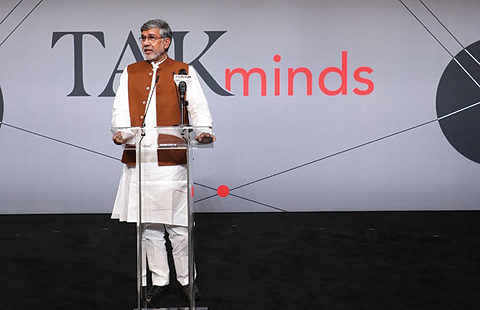Education 'very important' to get rid of poverty
 KUWAIT: Nobel Peace Laureate Kailash Satyarthi speaks during an event in Kuwait organized by TakMinds, a new platform launched by Takreem. — Photo by Reaven D’Souza
KUWAIT: Nobel Peace Laureate Kailash Satyarthi speaks during an event in Kuwait organized by TakMinds, a new platform launched by Takreem. — Photo by Reaven D’SouzaKUWAIT: Nobel Peace Laureate Kailash Satyarthi who has championed the cause of children for more than 37 years was in Kuwait recently as part of an event organized by TakMinds, a new platform launched by Takreem, which aims to highlight how changemakers and emerging talents are addressing current societal challenges. As the chief guest speaker, Kailash Satyarthi spoke about children's issues that were impacting the global peace process, as well as the need to act fast and comprehensively.
Having started his movement Bachpan Bachao Andolan (Save Childhood Movement) in 1981, Satyarthi has rescued almost 87,000 children from child labor, trafficking and slavery. In recognition of his efforts, in 2014, he was awarded the prestigious Nobel Peace Prize, along with Pakistani activist Malala Yousafzai, "for their struggle against the suppression of children and young people and for the right of all children to education."
In addition to child labor and slavery, he has been an active campaigner for children's rights on several fronts, including all forms of violence against children, such as sexual abuse, rape, health, malnutrition and others. The Kailash Satyarthi Children's Foundation that was set up after he received the Nobel Peace Prize in 2014 has been at the forefront of fighting for the protection of children everywhere.
Speaking to the media after the event, Satyarthi pointed out that there was a lot left to be done to protect children's rights everywhere, and that new legislation was required to safeguard these rights. "In the 35 minutes following the awarding of Nobel Peace Prize in 2014, the issue of children's rights received more global recognition than what I could do in 35 years," he said.
Satyarthi pointed out that all these are new initiatives that have never been undertaken in the past. "Some of the policy successes and accomplishments we had in the past, resulted in the ILO convention 182, which helped bring the issues of child abuse to the forefront."
"I am now working with the United Nations on a new convention that will expand the protection of children; this will be a legally binding international pact with very specific clauses against online child pornography, sexual abuse and child trafficking," he disclosed.
Satyarthi, who met the Pope in Rome a few days back to seek his support for the UN convention, said that he was very pleased with the meeting and the positivity shown by His Holiness towards the issue. Emphasizing the need for everyone to support children's issues, he said, "Children are the most vulnerable members of society, especially the marginalized children, they have no protection whatsoever. Moreover, since they have no voting rights, political interest in child issues is minimal."
Satyarthi said once we have a legally binding convention, then there are several mechanisms for monitoring its implementation, but his foundation has gone a step further in seeking added provisions that would include a global task force having extra-territorial jurisdiction and could be hosted by any UN agency. Also, a global helpline that will help track down syndicates anywhere will be crucial in the monitoring process.
Regarding the notion that child labor is directly linked to poverty, Satyarthi disputed this by pointing out that there are almost 210 million jobless adults who can easily replace the 150 million children workers, so every single child laborer is working at the cost of an adult.
"There are studies in many countries including India that indicate that most child laborers belong to parents who are not able to find work for even 100 days. Children cannot form unions, they are vulnerable and get exploited, so there is a parallel between adult unemployment and child labor," he pointed out.
Elaborating on this, he added that child labor is the biggest impediment in child education; if children are not able to get quality education then they will be poor for the rest of their lives, adding that if one has to get rid of poverty, then education is very important.
Globally, $22 billion are required annually to ensure primary education, and $39 billion would be required to ensure education up to secondary grade. "We have to prioritize education to see the social change and gender justice," he said, pointing out that governments are the main stake holder followed by the corporate sector.
By Reaven D'Souza










